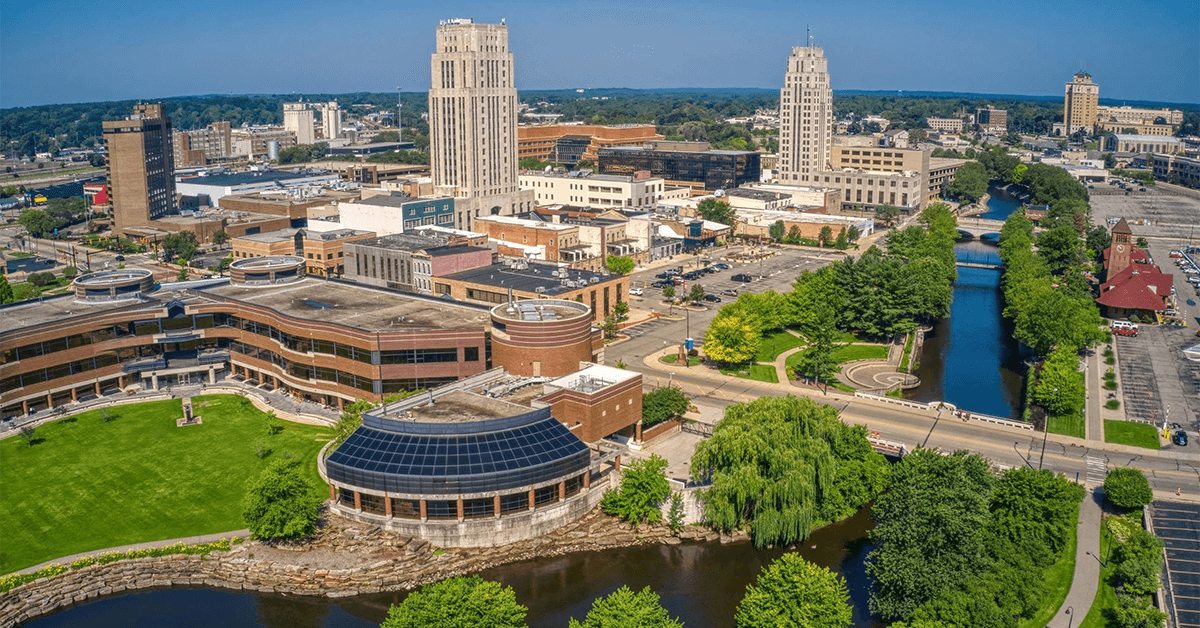Battle Creek Cannabis Businesses Receive State Grants for Social Equity

Four cannabis businesses in the Battle Creek area are set to receive grants exceeding $16,000 each through Michigan's Cannabis Regulatory Agency's statewide social equity program. The initiative aims to foster a more sustainable and equitable cannabis industry by supporting businesses in communities that have historically faced disproportionate challenges due to cannabis prohibition and enforcement.
State Senator Sarah Anthony highlighted the importance of this initiative, stating, "Since the legalization of cannabis in 2018, it's become evident that our state must take further steps to guide this burgeoning industry towards a more sustainable and equitable future." She added, "This opportunity allows for the reinvestment in local talent and the stimulation of economies in both urban and rural areas, such as Lansing, which have been adversely affected by the industry's emergence. Congratulations to the 62 awardees across the state and the seven grantees from the Greater Lansing region."
The Social Equity Grant Program, established following the 2018 legalization of adult-use cannabis by voter initiative, allocates a total of $1 million to 62 qualifying social equity licensees, each receiving $16,129. The program's creation underscores the state's commitment to remedying the historical inequities and fostering participation within the cannabis industry by individuals from impacted communities.
In Battle Creek, KDs Venture, NMR1, Simpots Enterprises, and Symponia Farms are among the recipients of this funding. This marks the first occasion that funds have been expressly designated to support social equity licensees.
Brian Hanna, Executive Director of the Cannabis Regulatory Agency, expressed his enthusiasm about the grants, "I'm thrilled to see our licensees utilize these funds to make positive impacts on their employees, communities, and businesses. Our social equity licensees truly deserve this opportunity."
To qualify for the Social Equity Grant Program (SEGP), recipients must hold a valid adult-use license issued by the CRA, be majority-owned by individuals eligible for the Social Equity Program, and be certified participants in the CRA's Social Equity All-Star Program.
The allocated SEGP funds are designated for use in specific areas, including employee education, business needs, and community investment. This includes funding for employees to pursue relevant education at accredited institutions, compliance with licensing and regulatory requirements, and support or donations to organizations, nonprofits, or charities that contribute positively to the community where the business operates.
Saline City Council Votes to Allow Cannabis Dispensaries Curbside Pickup

Saline's city council has approved a new ordinance that enables the city's cannabis dispensaries to offer curbside pickup services. The decision, made by a 5-2 vote, reflects the council's aim to provide consumers with more convenient purchasing options while addressing safety and regulatory concerns. Council members Dean Girbach and Janet Dillon opposed the ordinance, citing concerns over safety and the impact on communal spaces. Mayor Brian Marl, alongside councilors Chuck Lesch, Jack Ceo, Nicole Rice, and Jen Harmount, supported the ordinance, emphasizing the importance of adapting to consumer needs and the positive experiences of similar services in other locations.
The ordinance's approval came after discussions about the implications of curbside transactions, particularly regarding safety and the use of cash. Dillon expressed unease with the idea of cash transactions occurring outside the dispensaries and highlighted the unusual necessity of armed guards for these transactions. She compared this to routine activities like grocery or prescription pickups, which do not require such security measures.
In response, Councilor Rice argued that the presence of security guards was a direct response to safety concerns and should not be interpreted as an indication of increased risk. Rice pointed to the successful operation of curbside services in other areas, such as Hazel Park, without incident, suggesting that fears over safety may be overstated.
The ordinance allows dispensaries to designate up to five parking spaces for curbside pickups, though the variability of parking situations among dispensaries presents additional challenges. For example, differences in parking lot ownership and shared spaces with other businesses necessitate careful consideration of how curbside service is implemented to ensure minimal disruption and maintain safety for all patrons of the shared spaces.
Despite the economic development director's inability to find evidence of safety or traffic issues related to curbside pickup in other communities, some council members and residents remained concerned about the impact of the service on community values and the potential for it to facilitate unwanted behaviors.
The debate over curbside pickup in Saline touches on broader issues of cannabis regulation, community standards, and the balance between business innovation and public safety. As the city moves forward with this ordinance, it will be important to monitor its implementation and impact to ensure that the benefits are realized without compromising the wellbeing and values of the Saline community.
The Long Road to Cannabis Revenue in Ortonville, Michigan

In Ortonville, Michigan, a cannabis ordinance passed by a slim margin in August 2022 has yet to deliver significant financial returns to the community. The initiative, driven by Ortonville Residents for Action, received a green light with a vote tally of 221 to 216, permitting recreational cannabis enterprises within the village limits. Despite this approval, tangible benefits in terms of revenue have been scant.
Village Manager Ryan Madis reported that six applications were lodged for the two available licenses to operate cannabis businesses in Ortonville, with the village accruing only the application fees as revenue thus far. Each application carried a fee of $5,000, summing up to $30,000 collected from the 2022 submissions. Additionally, in 2023, the village garnered another $10,000 from applications for two licenses that had been conditionally approved the previous year.
The licenses were granted to an entity working alongside Canna Zoned, a real estate firm that assists in navigating the real estate and licensing process for cannabis businesses. However, the identity of the license owner has not been disclosed. Despite this progress, the timeline for the inauguration of retail establishments remains uncertain. Madis expressed concerns over the delayed realization of anticipated benefits, highlighting the village's ongoing wait to witness the promised economic uplift.
The potential financial advantage for Ortonville could exceed $300,000, considering the state Marijuana Regulation Fund's disbursement payments, which amounted to $118,172 for two licenses in 2023. Additionally, the license owner pledged $200,000 to the village as part of the state-mandated community benefits clause within the application process. Such community benefits are integral to the licensing applications, with proposals ranging from volunteer services by employees to infrastructural enhancements like the construction of a splash park.
Ortonville finds itself sidelined from a significant pool of revenue, with the state collecting $87 million in excise taxes in 2023, disbursed among various municipalities. The prospects for Ortonville receiving a portion of this financial windfall seem distant, exacerbated by delays in the submission and approval of site plans for the proposed cannabis businesses. Initial plans for the establishments, to be located on adjacent plots at 456 and 490 S. Ortonville Road, were rejected, with revised proposals still under review by the village.
Canna Zoned's attorney, Joey Kejbou, detailed efforts to align the new site plans with existing zoning regulations, emphasizing comprehensive renovations and enhancements that would negate the need for variances. However, township and county approvals remain pending for these sites, further delaying their operational commencement.
Kejbou also shed light on the owner's extensive involvement in Michigan's cannabis industry, noting their ownership and conditional approval of several facilities across the state. Despite the absence of a definitive timeline for the project's completion, Kejbou assured the village of the owner's commitment to contributing positively to Ortonville's economy.
New Buffalo Township Hits Pause on Dispensary Licenses After Receiving 35 Applications

New Buffalo Township has announced a temporary halt on the consideration of additional cannabis dispensary licenses following a surge in applications, having received a total of 35. This decision comes at a time when the township currently hosts only two operational dispensaries. The potential approval of all 35 applications would surpass the number of dispensaries in Detroit, highlighting the significant interest in the cannabis industry within the area.
Township officials have expressed concerns over the rapid increase in license requests, despite the promise of substantial tax revenue benefits. The decision to pause was influenced heavily by feedback from the local community, with the majority of residents voicing concerns over the implications of such an expansion.
Michelle Heit, the Supervisor of New Buffalo Township, reflected on the community's input, noting, "I'd say everyone that spoke tonight, other than maybe one person, was a local person. And the impact on them is what really helped make our decision." This statement underscores the township's commitment to considering the residents' perspectives in its regulatory decisions.
Applicants interested in submitting their license applications for consideration have been given a deadline until Monday. This includes submissions that may only be partially complete, indicating the township's willingness to review all potential entrants before finalizing its decision on the current moratorium.
Michigan's Social Equity Program Awards Grants to Lansing-Area Cannabis Businesses

In a recent announcement by Michigan's Cannabis Regulatory Agency (CRA), a group of Lansing-area cannabis businesses have been awarded grants exceeding $16,000 each, as a part of the state's efforts to foster a more equitable and sustainable cannabis industry through its Social Equity Grant Program. The program aims to support businesses in areas disproportionately affected by past cannabis policies, following the legalization of adult-use cannabis in 2018.
State Sen. Sarah Anthony highlighted the initiative's goals, emphasizing the importance of leveraging this opportunity to bolster local talent and stimulate economic growth in both urban and rural communities adversely impacted by the cannabis industry's development. "Since the legalization of cannabis in 2018, it has become evident that we must strive towards guiding this burgeoning industry towards a future marked by sustainability and equity," Anthony remarked.
The grants, each totaling $16,129, were distributed to 62 social equity licensees from a pool of $1 million allocated for this purpose. Among the recipients in the Lansing area were Biobizz, Capital City, Carbidex, Jartnick Consulting, and Smart Meds. Additionally, 120 West, located in Laingsburg, was also a beneficiary of the program's funds.
The Social Equity Grant Program was established in response to the 2018 voter-approved initiative that legalized adult-use cannabis. This initiative mandated the state to devise a strategy to enhance and encourage participation in the cannabis industry by individuals from communities historically marginalized and adversely affected by cannabis prohibition and enforcement.
Brian Hanna, the Executive Director of the CRA, expressed enthusiasm over the potential impacts of these grants: "I'm thrilled to see our licensees utilize these funds to make a positive difference in their employees' lives, their communities, and their businesses. Our social equity licensees truly deserve this opportunity."
Marking a significant first, this allocation of funds specifically targets the support of social equity licensees, setting a precedent for future endeavors. To qualify for the SEGP, grantees must possess a valid CRA-issued adult-use license, be majority-owned by individuals who are participants in the Social Equity Program, and have been certified as participants in the CRA's Social Equity All-Star Program.
The grants are intended for a range of uses, including but not limited to, financing educational courses relevant to the business for employees, ensuring compliance with licensing and regulatory statutes, or making contributions to organizations, nonprofits, and charities that have a positive impact on the community where the business operates.
Michigan Debates the Merits of a State-Run Cannabis Testing Lab



 Helpful Links
Helpful Links